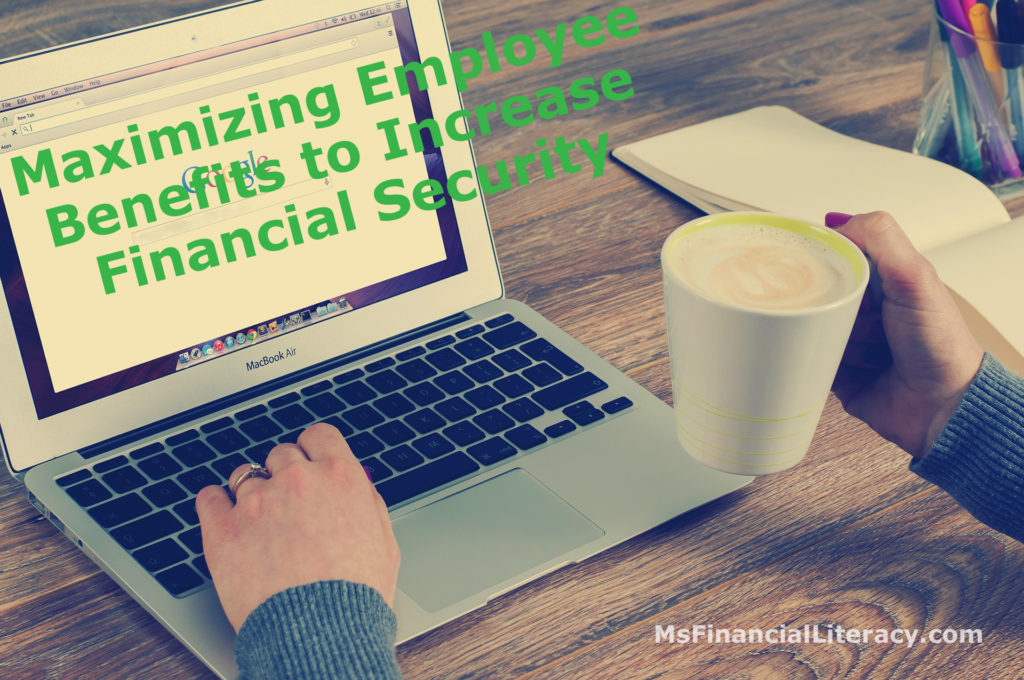
Readers, what are some of the things you have been/are doing to increase your financial security? Increasing income? Minimizing spending? Getting into another career path? Starting a side hustle? Building a large investment portfolio? Acquiring rental properties? For those of us who are receiving W2 income, do you rely on your employee non-wage benefits (such as insurance and retirement benefits) for financial security? In this post, I share how I used to perceive my employee non-wage benefits, how I came to see their true values and why choosing the best benefits options for myself and my family is a great thing I can do to increase my family’s overall financial security.
How I Used to Perceive My Employee Non-Wage Benefits
For a long time, I took my employee benefits for granted. I used to only focus on the numbers on my bi-weekly pay statements. I could actually do something with my W2 earnings (such as purchasing more stocks and paying bills). My non-wage benefits were something that my husband and I typically looked at few times a year, and then they were forgotten until we needed to reevaluate the benefits options again. It wasn’t until earlier this year (2016) that I realized how much those non-wage benefits contribute to my overall financial security.
As a new employee, I loved reviewing my employment benefits. I thought it was so cool that my employer was paying me while I went on vacations, giving me extra money toward my retirement savings, offering me discounted life and group disability insurances and allowed me to take eight months off to spend with my daughter after her birth (and I also got paid during part of the time off!). The list could go on. I felt great having all those “freebies” that came with my employment compensation. While I appreciated my employer looking out for my well-being and that of my family, for a long time I never realized how much I’ve came to depend on those non-wage benefits for peace of mind. I suppose I didn’t or couldn’t see the true values of those benefits when I wasn’t paying the premiums out of my pocket or no monetary values were placed on them. What I couldn’t see didn’t count, right?
How I Came to See My Benefits’ True Values
Several months ago when my husband and I learned about the financial independence and retiring early (FIRE) movement, for a short while we weren’t sure we were ready to do early retirement. Once we started looking into how much we would need to budget for various insurance premiums, the amount of money our employers are matching in our 401(k)s, the monetary values of our paid time off, etc, we felt conflicted! As we were doing the exercise, for the first time, we realized how much money our combined non-wage benefits roughly summed up to. Just our combined 401(k) matches alone was over $6,000. Yes, our benefits through our employers were very enticing and we weren’t ready to let go. Despite us being at a point financially where we can forgo all those benefits, psychologically, giving up these amazing benefits is a hard task!
Having done that exercise above, I also became aware how much my husband and I have been depending on our employers protecting our financial security. Once we had a list of our all non-wage benefits, my husband and I asked ourselves and each other which of the benefits on the list we must continue to keep when we eventually leave our W2 employments and which we can forgo. It turned out there were a whole lot we wanted to keep! For the first time, I realized how much our employers have been “cushioning” us through the non-wage compensations they offer. Prior to that moment, I used to think of financial security in terms of the amount of cash we’ve set aside for emergency, the amount of money our employers compensate us through W2 wages and the size of our retirement savings. While life insurance has always been a high priority in our household and I always consider that a financial security, it has taken me a long time before I started making the connections between my employee non-wage benefits and my overall financial security.
Maximizing Benefits to Increase My Family’s Overall Financial Security
Once I realized how valuable our non-wage benefits are and how much those benefits have been contributing to our household financial security, I want to do everything I can and know of to maximize those benefits. Our combined non-wage employment benefits sum up to a significant percent to the value of our W2 wages. Thus, we greatly benefit when we fully take advantage of all those benefits. With Open Enrollment period coming up in a month or so for my husband (mine is in the month of May), we’re very excited. We’ll spend some time going through his benefits package, take a look at what we currently have, reevaluate our family situation and take actions to maximize the full value of his employment benefits (this step might involve having a conversation with HR). While we like to think we’re pretty knowledgeable and resourceful people, there can still be items we might have missed from the previous year. For instance, I just recently learned that my employer offers ID theft protection for my whole family. We don’t currently need this service, but it’s good to know. We can’t predict the unexpected. Maximizing our benefits is a great way to protect our financial standing.
As a woman, wife, parent and daughter, my usual instinct is always putting priority focusing on the immediate needs of my family. However, it’s also very important that I take the time to plan for the unexpected. I don’t know when there might be a major medical emergency, a job loss or a major car accident. Taking the time to learn about our employment benefits and knowing how to maximize those benefits is a major step toward building our financial confidence and financial security. The great news is that both of our employers make it easy and affordable for us to enroll in basic group plans. Even the buy-up options are usually offered at discounts when we pay premiums with pretax money.
At first, all the benefits options may seem overwhelming. If that’s the case for you, I encourage you to first make a list of priorities in regards to what you need to do to protect yourself and your loved ones. Then, commit to tackling the list one thing at a time. Based from experience, it’s likely that as you take actions to protect yourself and your family you’re also thinking about planning for retirement and reducing the taxes you pay now.
As Open Enrollment period is near for many of us, I encourage each of us to educate ourselves on the benefits offered by our employers. Some of those benefits aren’t only for ourselves but for our loved ones, too. By understanding the ins and outs of all our benefits, we can choose the best options for ourselves and our family. In the near future, I will devote individual posts discussing insurances (short-term disability, long-term group disability, health insurance, life insurance), retirement plans (pension, 401(k), 403(b)) and various enhanced benefits (e.g., health and dependent flexible spending accounts, group legal benefits, employee stock purchase plans, accidental death and dismemberment policies, wellness programs, pretax transportation vouchers). As you can see, we have a lot to explore and learn and each benefit can help us increase financial security. I hope you’ll stay around!
Do your employee non-wage benefits play a major role in contributing to your overall financial security?
What kind of support does your HR have in place to help you get the most out of benefits being offered?
Which benefits do you value the most?
What other benefits would you like to see as part of your compensation through your employer?
Recommended readings: The Guardian Workplace Benefits Study, 2015 (Online article); Smart Women Finish Rich: 9 Steps to Achieving Financial Security and Funding Your Dreams (book)
